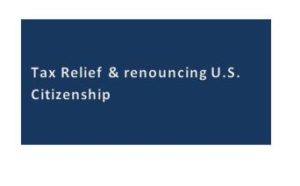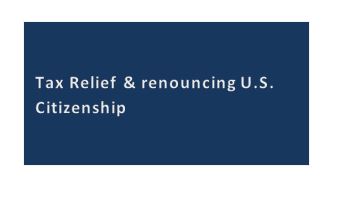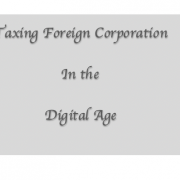Tax Relief for Expats who Renounce U.S. Citizenship
Relief Procedures for former U.S. Citizens
 The new procedures attempt to address problems faced by some U.S. citizens, whose only connection with the United States is that they were born in America. Many of these individuals have been living overseas since an early age, and in some cases, are also citizens of the foreign country in which they reside.
The new procedures attempt to address problems faced by some U.S. citizens, whose only connection with the United States is that they were born in America. Many of these individuals have been living overseas since an early age, and in some cases, are also citizens of the foreign country in which they reside.
The new procedures are aimed at providing relief to these former citizens who have had to deal with the problems associated with FATCA and other U.S. tax and reporting obligations. In case of FATCA, many foreign financial institutions have elected to close the accounts of U.S. expats rather than deal with the onerous compliance requirements and the 30% withholding obligations.
Consequently, expats have found banking overseas difficult if not impossible. In response to the problem, some have decided to renounce their U.S. Citizenship after determining that the benefits of U.S. Citizenship were outweighed by the problems FATCA and other U.S. tax and financial reporting requirements have created. Prior to the announcement, however, these expats were still expected to pay income tax on money they previously earned. The new Procedures address this concern.
Eligibility criteria and requirements under the Relief Procedures
Under the new procedures, eligible Individuals include those who relinquished their U.S. citizenship any time after March 18, 2010, the year FATCA was enacted and who also meet the following criteria:
- The Taxpayer has failed to file U.S. tax returns;
- The Taxpayer owes a limited amount of back taxes to the U.S. government ($25,000 in the past six years);
- The Taxpayer has net assets of less than $2 million; and
- Any prior U.S. compliance failure with the IRS was not due to willful conduct.
It is important to note that the procedures are only available to individuals. This means that estates, trusts, corporations, partnerships and other entities can’t use the procedures.
Those who are eligible are required to file outstanding U.S. tax returns, including all required schedules and information returns for the five years preceding and their year of expatriation. If the total tax for the six years period is less than $25,000, the taxpayer is relieved from paying U.S. taxes. Individuals who qualify for the procedures won’t be assessed penalties and interest.
Despite the relief the new procedures provide for U.S. citizens, the IRS cautions citizens regarding the permanent nature and consequences associated with relinquishing U.S. citizenship:
“Relinquishing U.S. citizenship and the tax consequences that follow are serious matters that involve irrevocable decisions,” said the IRS. “Taxpayers who relinquish citizenship without complying with their U.S. tax obligations are subject to the significant tax consequences of the U.S. expatriation tax regime. Taxpayers interested in these procedures should read all the materials carefully, including the FAQs, and consider consulting legal counsel before making any decisions.”
The decision to relinquish one’s U.S. citizenship requires a careful evaluation of both quantitative and qualitative factors including income tax consequences, quality of life and mobility. In addition, any such decision needs to be evaluated in the context of political risk. Therefore, it is advisable that those who are contemplating renouncing their U.S. citizenship should consult with an experienced tax attorney who is familiar with the process, as well as the risks.








